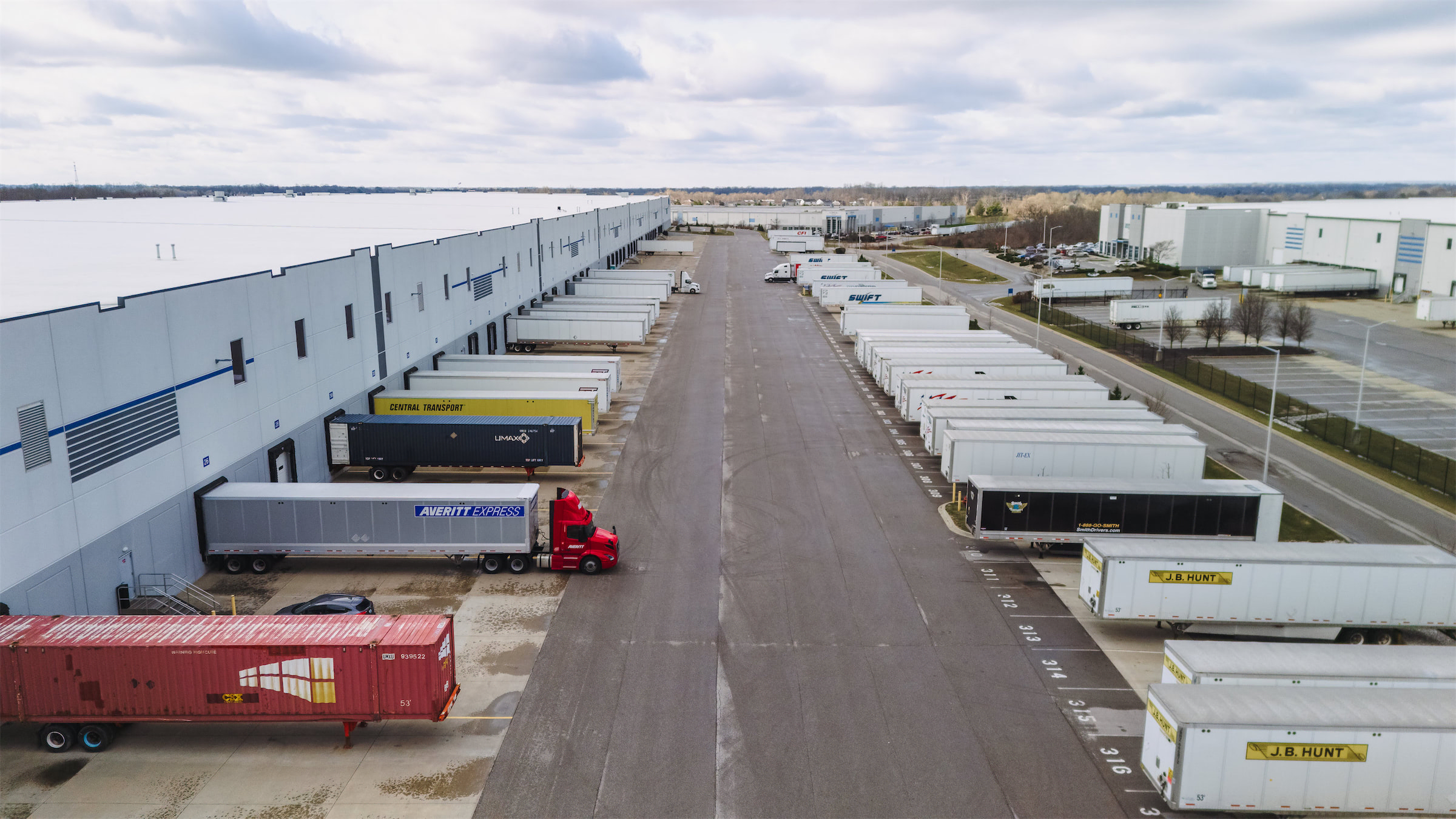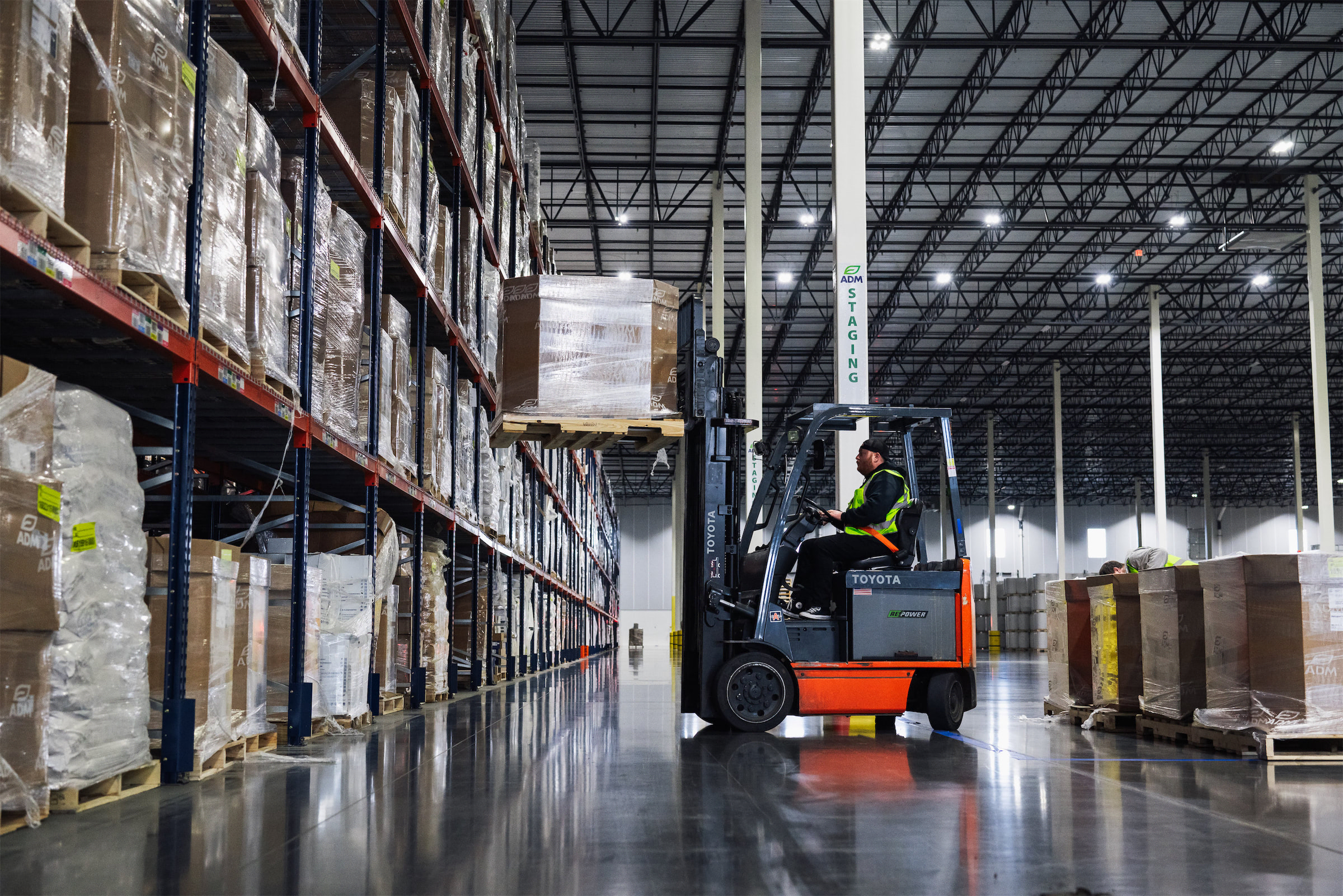Omnichannel Fulfillment for CPG Brands: Unifying B2B and D2C from One Warehouse

Managing separate B2B and D2C fulfillment operations doubles complexity while fragmenting inventory visibility. Learn how unified omnichannel warehousing eliminates inefficiencies, prevents channel conflicts, and positions CPG brands for sustainable growth.
The Consumer Packaged Goods industry is experiencing a seismic shift. Brands that once relied entirely on retail partnerships now sell directly to consumers through e-commerce channels. Traditional B2B-only companies launch D2C initiatives to capture higher margins and customer data. Meanwhile, digitally-native brands expand into retail, discovering that shipping pallets to major retailers requires vastly different capabilities than sending parcels to consumers.
This omnichannel evolution creates a fundamental operational challenge: how do you efficiently manage two completely different fulfillment models from the same inventory? B2B fulfillment involves pallets, strict routing guides, and chargebacks for non-compliance. D2C requires individual pick-and-pack, gift messaging, and customer experience excellence. Many CPG brands attempt to solve this by maintaining separate inventories and fulfillment operations, doubling complexity and cost while reducing inventory visibility.
The stakes for getting omnichannel fulfillment wrong extend beyond operational inefficiency. Poor retail compliance can result in devastating chargebacks and lost shelf space. Subpar D2C fulfillment damages brand reputation and customer lifetime value. Inventory fragmentation leads to stockouts in one channel while excess inventory languishes in another.
The Convergence Challenge
The convergence of B2B and D2C fulfillment represents more than a simple operational challenge; it requires fundamentally reimagining how CPG brands manage their supply chains. Traditional approaches that treat these channels as separate entities create inefficiencies that compound as businesses scale.
Inventory fragmentation stands as the most visible symptom of channel separation. When brands maintain separate stock for retail and D2C channels, they inevitably face situations where one channel stocks out while the other holds excess inventory. The financial impact extends beyond expedited shipping costs to include lost sales, marked-down excess inventory, and working capital trapped in duplicate safety stock.
Operational complexity multiplies when managing distinct fulfillment processes. Separate facilities mean duplicate staff, systems, and equipment. Different workflows require unique training programs and quality standards. Technology integration becomes increasingly complex with multiple systems that must somehow share data. The true cost of this complexity often exceeds the direct operational expenses when factoring in management time and missed opportunities.
Customer expectations have evolved to demand channel fluidity that separated operations cannot deliver. Today's consumers expect to buy online and return in-store, check store inventory from mobile apps, and receive consistent pricing and promotions across channels. B2B buyers increasingly expect B2C-like experiences with real-time inventory visibility, flexible delivery options, and seamless reordering. Meeting these expectations requires unified operations that can serve all channels efficiently.
Data blindness resulting from channel separation prevents CPG brands from understanding true demand patterns. When inventory and fulfillment data exist in separate systems, brands cannot accurately forecast demand, identify cross-channel purchase patterns, optimize inventory placement, or calculate customer profitability. This lack of visibility leads to reactive rather than strategic decision-making.
Commonwealth's CPG Expertise
Commonwealth's CPG logistics services are specifically designed to address the unique challenges of consumer packaged goods distribution. The company understands that CPG brands must navigate fluctuating demand, tight delivery windows, and complex retail compliance requirements while simultaneously managing direct-to-consumer fulfillment.
Commonwealth's warehouses are optimized for CPG operations with high-volume, high-turnover storage systems that maximize efficiency. The facilities include temperature and humidity-controlled areas for sensitive products, food-grade certified storage spaces for consumables, and advanced pick-and-pack operations for both retail and e-commerce fulfillment. This infrastructure enables CPG brands to consolidate operations while maintaining channel-specific capabilities.
The company's experience spans a wide range of CPG products including personal care items, household cleaning products, food and beverages, pet supplies, over-the-counter pharmaceuticals, paper products, small appliances, home decor items, seasonal products, health and wellness goods, and beauty products. This diverse experience translates into established best practices for handling various product types and fulfillment requirements.
Unified Inventory Management
Unified inventory management forms the foundation of successful omnichannel fulfillment. By maintaining a single inventory pool that serves all channels, CPG brands can optimize stock levels, improve service, and reduce working capital requirements.
Commonwealth's warehousing services enable sophisticated inventory management across channels. The company's FIFO/FEFO inventory management capabilities ensure product freshness while serving both retail and direct-to-consumer channels. Advanced pick-and-pack operations can handle everything from full pallet shipments to individual consumer orders from the same inventory pool.
The ability to leverage both contract and public warehousing provides CPG brands with flexibility in managing omnichannel inventory. Contract warehousing offers dedicated resources for base volume and specialized operations, while public warehousing provides surge capacity for seasonal peaks or promotional periods. This hybrid approach allows brands to maintain service levels without overinvesting in fixed capacity.
Real-time inventory visibility across channels prevents overselling and enables accurate promise dates. Commonwealth's advanced warehouse management systems track inventory at the lot level, essential for products with expiration dates or batch tracking requirements. This granular visibility supports both retail compliance requirements and consumer safety standards.
Retail Compliance Excellence
B2B fulfillment in an omnichannel environment requires maintaining the efficiency and compliance that retail partners demand while sharing resources with D2C operations. Success requires understanding the unique requirements of retail fulfillment and implementing processes that ensure consistent execution.
Commonwealth's CPG capabilities include extensive retail compliance expertise. The company states they "maintain up-to-date knowledge of major retailers' routing guides and have processes in place to ensure all shipments meet specific retailer requirements." This expertise proves invaluable for CPG brands navigating the complex and ever-changing requirements of major retail partners.
EDI integration capabilities enable seamless order processing with retail partners. Commonwealth's EDI integration for CPG operations ensures accurate order transmission, timely advance ship notices, and compliance with retailer-specific requirements. This automation reduces errors while improving processing speed—critical factors in avoiding costly chargebacks.
Retail-ready packaging and display building services support successful product launches and promotional campaigns. Commonwealth can handle retail compliance labeling, ensuring products meet specific retailer requirements for barcodes, pricing, and other information. These value-added services allow CPG brands to meet diverse retail requirements without maintaining multiple packaging lines.
Direct-to-Consumer Excellence
Direct-to-consumer fulfillment in an omnichannel environment must deliver e-commerce excellence while leveraging shared infrastructure with B2B operations. The challenge lies in maintaining the personalization and flexibility consumers expect without sacrificing operational efficiency.
Commonwealth explicitly confirms their omnichannel fulfillment capabilities, stating they can "efficiently manage both direct-to-consumer and retail distribution from the same inventory." This unified approach eliminates the need for separate D2C operations while maintaining service quality across channels.
Advanced pick-and-pack operations support efficient D2C fulfillment. With kitting and assembly areas integrated into their CPG warehouses, Commonwealth can handle complex consumer orders including variety packs, gift sets, and personalized bundles. These capabilities prove particularly valuable during peak seasons when D2C volumes surge.
Strategic location advantages enhance D2C fulfillment speed. Commonwealth's Cincinnati-area facilities provide proximity to major shipping carriers and central positioning for reaching customers throughout the Midwest and beyond. This geographic advantage translates into faster delivery times and lower shipping costs for D2C orders.
Value-Added Services Across Channels
Value-added services transform basic fulfillment into strategic capabilities that differentiate CPG brands in competitive markets. These services must support both B2B and D2C requirements while maintaining operational efficiency.
Commonwealth's value-added services for CPG brands include kitting for creating product bundles, display building for retail promotions, coordinated distribution for product launches, and specialized handling for seasonal products. These services can be applied across channels, creating retail displays for stores while simultaneously preparing gift sets for online customers.
Quality control and inspection services ensure product integrity regardless of channel. Commonwealth's facilities include areas for product inspection, allowing brands to verify quality before products reach customers. This proves particularly important for CPG brands where product appearance and packaging integrity directly impact brand perception.
The ability to handle promotional campaigns across channels represents a key differentiator. Commonwealth can support both retail promotions requiring special displays or packaging and D2C promotions involving limited-edition bundles or personalized products. This flexibility allows CPG brands to execute unified marketing campaigns without operational constraints.
Technology and Integration
Technology infrastructure forms the backbone of successful omnichannel fulfillment. Systems must seamlessly coordinate activities across channels while providing visibility and control to brand managers.
Commonwealth's technology capabilities include EDI integration for seamless order processing with retail partners and advanced warehouse management systems for inventory tracking and fulfillment. These systems work together to provide unified operations across channels while maintaining channel-specific requirements and reporting.
The company's insights on 3PL solutions highlight the importance of technology in modern logistics operations. Integrated systems enable real-time inventory visibility, automated order routing, and comprehensive reporting that spans all channels. This technological foundation proves essential for CPG brands managing complex omnichannel operations.
Data analytics capabilities help CPG brands optimize their omnichannel strategies. By consolidating data from all channels, brands can identify trends, optimize inventory placement, and improve forecasting accuracy. This data-driven approach transforms fulfillment from a cost center into a strategic advantage.
Transportation Optimization
Transportation optimization across channels requires balancing the different delivery requirements of B2B and D2C fulfillment while minimizing costs. The ability to leverage various transportation modes and strategies becomes crucial for omnichannel success.
Commonwealth's transportation services span the full spectrum needed for omnichannel CPG fulfillment. From truckload and LTL services for retail shipments to parcel delivery for D2C orders, the company can optimize transportation based on specific requirements rather than forcing brands into limited options.
Rail service capabilities through CSX connectivity provide cost-effective options for moving large volumes of inventory between regions. This proves particularly valuable for CPG brands managing national distribution, allowing economical positioning of inventory near key markets.
The multimodal approach to transportation enables optimization based on specific shipment characteristics. Retail replenishment might utilize full truckload shipments for efficiency, while D2C orders leverage parcel networks for residential delivery. The ability to coordinate these different modes through a single provider simplifies management while reducing costs.
Peak Season and Promotional Management
Peak seasons and promotional periods create unique challenges for omnichannel fulfillment as both channels experience simultaneous demand surges. Success requires careful planning and scalable execution capabilities.
Commonwealth's public warehousing options provide crucial flexibility during peak periods. The guide notes that businesses typically save 15-30% on fixed costs by using public warehousing for seasonal inventory. This scalability allows CPG brands to handle promotional surges without maintaining year-round capacity.
The company's experience with seasonal products and promotional campaigns translates into established processes for managing volume fluctuations. Whether handling back-to-school promotions, holiday gift sets, or summer seasonal items, Commonwealth can scale operations to meet demand while maintaining service levels across channels.
Strategic inventory positioning before peak seasons helps ensure product availability. Commonwealth's multiple facility locations enable pre-positioning of inventory near key markets, reducing delivery times during high-demand periods when carrier networks are stressed.
Transform Your CPG Fulfillment Strategy
The evolution from single-channel to omnichannel fulfillment represents both a challenge and an opportunity for CPG brands. Those who successfully unify their B2B and D2C operations from a single inventory pool will gain competitive advantages in efficiency, flexibility, and customer experience.
Commonwealth Inc. specializes in omnichannel fulfillment for CPG brands, providing the infrastructure and expertise to seamlessly serve both retail and direct-to-consumer channels. With extensive experience serving CPG companies and proven capabilities in both contract warehousing and public warehousing, Commonwealth can design solutions that reduce costs, improve service, and accelerate growth across all channels.
Ready to unify your omnichannel fulfillment? Contact Commonwealth Inc. today to learn how our integrated CPG fulfillment solutions can transform your supply chain performance across all channels.
Frequently Asked Questions
Can Commonwealth handle both e-commerce and retail distribution?
Yes, Commonwealth explicitly confirms they can efficiently manage both direct-to-consumer and retail distribution from the same inventory. Their omnichannel fulfillment capabilities allow CPG brands to serve all channels from unified inventory pools, eliminating the inefficiencies of separated operations.
What retail compliance capabilities does Commonwealth offer?
Commonwealth maintains up-to-date knowledge of major retailers' routing guides and has processes in place to ensure all shipments meet specific retailer requirements. They offer EDI integration for seamless order processing, retail compliance labeling capabilities, and the expertise to navigate complex retail requirements.
How does Commonwealth support CPG product launches and promotions?
Commonwealth offers specialized services including kitting, display building, and coordinated distribution to support successful product launches and promotional campaigns. They can handle both retail requirements like special displays and D2C needs like limited-edition bundles from the same facility.
What types of CPG products can Commonwealth handle?
Commonwealth has experience managing logistics for a wide range of CPG products including personal care items, household cleaning products, food and beverages, pet supplies, over-the-counter pharmaceuticals, paper products, small appliances, home decor items, seasonal products, health and wellness goods, and beauty products.
Does Commonwealth offer temperature-controlled storage for CPG products?
Yes, Commonwealth's CPG warehouses include temperature and humidity-controlled areas to maintain product integrity. They also maintain food-grade certified storage spaces for consumable products, ensuring appropriate storage conditions for sensitive CPG items.
What technology capabilities does Commonwealth provide for CPG brands?
Commonwealth offers EDI integration for seamless retail order processing, advanced warehouse management systems for inventory tracking, FIFO/FEFO inventory management capabilities, and real-time reporting through their systems. These technologies enable efficient omnichannel operations with full visibility.
Can Commonwealth handle seasonal fluctuations in CPG demand?
Yes, Commonwealth offers both contract and public warehousing options that provide flexibility for seasonal demands. Public warehousing can provide surge capacity during peak seasons, while contract warehousing offers dedicated resources for base volumes. This hybrid approach optimizes costs while maintaining service levels.
What value-added services does Commonwealth offer for CPG?
Commonwealth provides comprehensive value-added services including retail-ready packaging and display building, kitting and assembly for bundles and variety packs, custom labeling services, quality control and inspection, and specialized handling for promotional campaigns. These services support both retail and D2C channel requirements.
How do Commonwealth's locations benefit CPG distribution?
Commonwealth's strategic Greater Cincinnati locations provide optimal positioning near major retail distribution centers while also offering excellent parcel shipping access for D2C fulfillment. The central Midwest location enables efficient distribution throughout the region and beyond.
Can Commonwealth support subscription box fulfillment?
While not explicitly mentioned, Commonwealth's advanced pick-and-pack operations and kitting capabilities position them well to handle subscription box fulfillment alongside traditional CPG orders. Their ability to create custom bundles and manage recurring shipments supports subscription-based business models.
Recent blogs

5 Signs You've Outgrown Your Current Warehouse Solution
It happens gradually, then suddenly. Your once-adequate warehouse operation starts showing stress fractures—orders ship late, inventory accuracy declines, costs creep upward. Here are some signs it's time for a change.

Converting Fixed Costs to Variable: The Financial Impact of Outsourced Warehousing
The holy grail of financial management is achieving perfect cost variability; expenses that scale precisely with revenue. Discover how converting to variable costs fundamentally changes your financial risk profile.

Peak Season Playbook: Scaling Warehouse Operations
Every operations manager knows the peak season paradox: you need double the warehouse capacity and triple the labor force for three months, but you can't afford to maintain those resources year-round. This guide reveals proven strategies for scaling efficiently during demand spikes while controlling costs.
Arrange a visit
See the Commonwealth difference in action
We believe the best way to understand our capabilities is to experience them firsthand. We invite you to tour one of our facilities, meet our team, and discover how Commonwealth can optimize your logistics operations. Let us show you why so many businesses trust us with their supply chain needs.
Let’s optimize your supply chain together
At Commonwealth, we're committed to providing tailored logistics solutions that meet your unique business needs. Whether you have a question about our services, want to request a quote, or are ready to schedule a facility tour, our team is here to help.